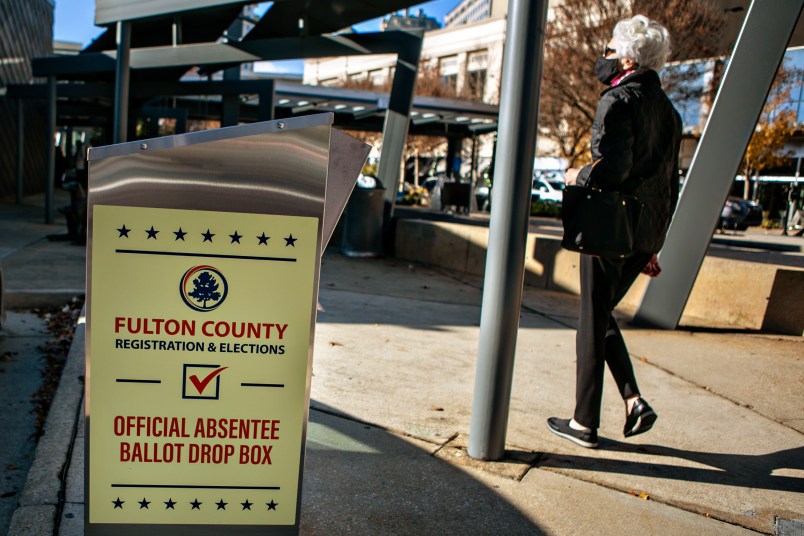As Georgia’s Republican lawmakers consider measures that would make it more difficult to vote, they’re also eying ways to let the legislature have more influence over local election administration.
The proposals come after local and state election officials stood up to President Trump’s false claims of mass fraud in the presidential race. Now, if the proposed measure becomes law, not only will election officials be on the hook for implementing more restrictive regimes — the legislature is also looking to make it easier to fully dismantle local election boards, if state legislators or other county officials aren’t happy with the job they’re doing.
The proposed changes are in a bill known as SB 202. It is one of multiple sprawling election bills that have attracted scrutiny for how they would make it harder to vote in the state. SB 202 appears to be a leading contender for what will ultimately land on Gov. Brian Kemp’s (R) desk.
It includes provisions that appear targeted at how election officials pushed back on attempts by President Trump and his allies to subvert Georgia’s elections.
Officials in several counties, for instance, rebuffed a gambit spearheaded by conservative activists to challenge the eligibility of tens of thousands of voters in the state before the Senate run-offs.
SB 202 gives a green light to these kinds of mass challenges. The bill also threatens county officials with sanctions if they do not comply with the process, which, under the new bill, would also require a hearing on each challenge within ten days.
“This SB 202 bill is a bill that will open up and legalize, encourage and incite racist targeting of voters and harassment and intimidation like we have never seen before,” Lauren Groh-Wargo, the CEO of Fair Fight Action, a Democratic-aligned voting rights group, told reporters on a press call Tuesday.
Among the officials Republican lawmakers seem to be singling out is Georgia Secretary of State Brad Raffensperger, who consistently rebuked Trump’s claims of mass fraud in the presidential election.
The bill would sideline the secretary of state’s role on the state election board, demoting him from chairperson to a non-voting member. The chair, under the legislation, would be filled by an individual chosen by the general assembly. The legislature already choses two of the four other board members (the state Democratic and Republican parties fill the final two seats), meaning that its appointees would constitute a majority and could establish a quorum under the legislation.
The restructuring of the state’s board’s leadership would limit “oversight” and reduce “accountability,” said Aunna Dennis, the Georgia director for the voting rights group Common Cause. She raised the possibility that this new chair would act as a “czar” of voting in the state.
The bill “cedes a lot of power to the legislature to allow them to pick the chairperson,” Rahul Garabadu, a staff attorney at the ACLU’s Georgia chapter, told TPM. “Giving that legislative power over what is traditionally an executive function is what is so dangerous about it.”
This newly reconfigured board would also, under the legislation, be given sweeping powers to meddle in county-level election administration decisions. It allows the state agency to dismantle county election boards wholesale, and replace them with election superintendents selected by the state agency. That person would have full control of both funding and personnel decisions made in county election administration.
The bill sets a “pretty low bar” for justifying a state takeover of a local election entity, Garabadu said. The process could be triggered by a request from another official in the county, or via petitions from the state legislators that represent the county.
“What we are seeing is an infusion of our legislators within our local elections,” said Aklima Khondoker, the Georgia state director of the voting rights group All Voting is Local. “They’re giving credence to unsubstantiated claims that have never been verified, while also seizing control away from our counties.”
Among the types of allegations that can be brought against county election officials are those that question their competence in implementing “administration of elections” and “voter registration.” That latter reference has voter advocates concerned that the takeover provisions could be pointed at counties that refuse to go along with far-reaching voter purge campaigns pushed by Republican-aligned groups.
One such endeavor was launched by conservative activists during the run-offs, when the Texas based voter fraud alarmist group True the Vote coordinated an effort to challenge the eligibility of 364,000 voters.
The vast majority of Georgia counties rejected the challenges. The current Georgia law around voter challenges has been interpreted as implying that electors challenging voters should know those voters or their circumstances personally. The new legislation makes clear that there is no limit on the number of challenges a person can bring, while requiring that counties grant each challenge a hearing within 10 days.
The bill “almost invites more baseless challenges,” Garabadu, the ACLU attorney, said.
Counties can be sanctioned, under the bill, for not following the procedures around challenges.
There are more subtle ways that the legislation — which could be voted out of the legislature as early as Thursday — hamstrings county officials. It imposes limits on the use of mail ballot drop boxes, restricting where such receptacles can be located and the hours during which they can be accessed.
Additionally, the legislation prohibits local election boards from accepting grant money from private organizations, after some Georgia counties received philanthropic funding to adept their election infrastructure to the pandemic.
With about a week left for the legislative session, Republican lawmakers are expected to coalesce around an election overhaul bill in the coming days. The other omnibus bill gaining traction, HB 531, also includes a provision making it easier for the state to remove county election officials.



